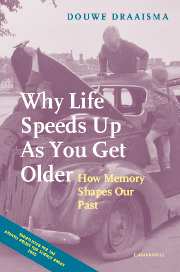Book contents
- Frontmatter
- Contents
- List of illustrations
- Acknowledgments
- 1 ‘Memory is like a dog that lies down where it pleases’
- 2 Flashes in the dark: first memories
- 3 Smell and memory
- 4 Yesterday's record
- 5 The inner flashbulb
- 6 ‘Why do we remember forwards and not backwards?’
- 7 The absolute memories of Funes and Sherashevsky
- 8 The advantages of a defect: the savant syndrome
- 9 The memory of a grandmaster: a conversation with Ton Sijbrands
- 10 Trauma and memory: the Demjanjuk case
- 11 Richard and Anna Wagner: forty-five years of married life
- 12 ‘In oval mirrors we drive around’: on experiencing a sense of déjà vu
- 13 Reminiscences
- 14 Why life speeds up as you get older
- 15 Forgetting
- 16 ‘I saw my life flash before me’
- 17 From memory – Portrait with Still Life
- Index of names
12 - ‘In oval mirrors we drive around’: on experiencing a sense of déjà vu
Published online by Cambridge University Press: 22 September 2009
- Frontmatter
- Contents
- List of illustrations
- Acknowledgments
- 1 ‘Memory is like a dog that lies down where it pleases’
- 2 Flashes in the dark: first memories
- 3 Smell and memory
- 4 Yesterday's record
- 5 The inner flashbulb
- 6 ‘Why do we remember forwards and not backwards?’
- 7 The absolute memories of Funes and Sherashevsky
- 8 The advantages of a defect: the savant syndrome
- 9 The memory of a grandmaster: a conversation with Ton Sijbrands
- 10 Trauma and memory: the Demjanjuk case
- 11 Richard and Anna Wagner: forty-five years of married life
- 12 ‘In oval mirrors we drive around’: on experiencing a sense of déjà vu
- 13 Reminiscences
- 14 Why life speeds up as you get older
- 15 Forgetting
- 16 ‘I saw my life flash before me’
- 17 From memory – Portrait with Still Life
- Index of names
Summary
In oval mirrors we drive around;
see in ourselves our own background
and know it too could once be found.
GERRIT ACHTERBERG, ‘Déjà-vu’, 1952David Copperfield is a tale of two loves. When young David goes to school in Canterbury, he is taken into the hospitable home of Mr Wickfield, a lawyer running a rich gentleman's estate. There he meets Wickfield's daughter Agnes, who is about the same age as himself and who captivates him with her lovely face and composed manner. He quietly observes the tact with which Agnes treats her father who, after his wife's death, has started to drink more than is good for him. Unfortunately she cannot prevent his practice from going into a steep decline, and Uriah Heep, Wickfield's crafty clerk, is able to force her father to make him a partner. When David continues his education in London, he often seeks Agnes's advice, revelling in her wisdom and affection.
In London David is articled to Mr Spenlow. At a dinner he is introduced to Spenlow's daughter Dora. It is love at first sight: he loses his heart and perhaps a little of his good sense as well. Dora is in many respects the very opposite of Agnes. She is a ‘child wife’, playful and flighty, but also capricious and easily upset. Against his great-aunt's advice he marries Dora. The marriage is idyllic in the beginning, but it gradually becomes clear that David cannot really count on her support.
- Type
- Chapter
- Information
- Why Life Speeds Up As You Get OlderHow Memory Shapes our Past, pp. 141 - 171Publisher: Cambridge University PressPrint publication year: 2004



